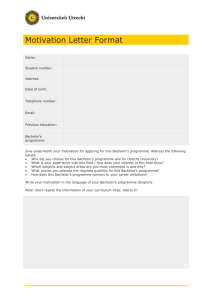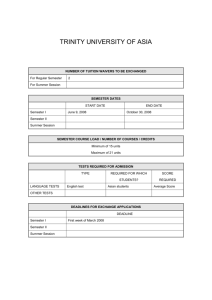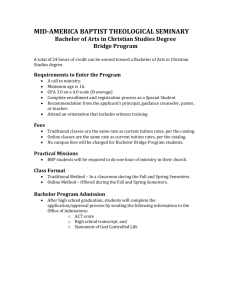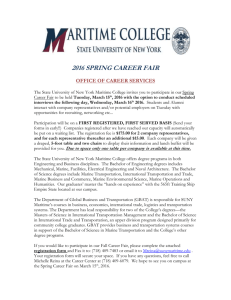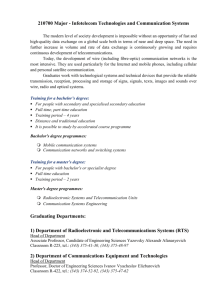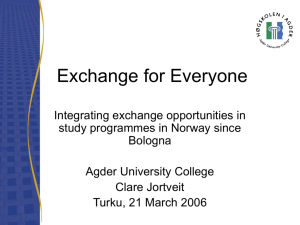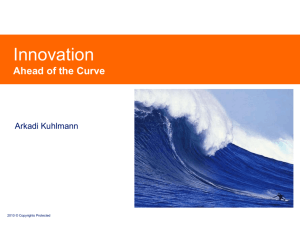IUT QUIMPER UNIVERSITE DE BRETAGNE OCCIDENTALE 3rd
advertisement
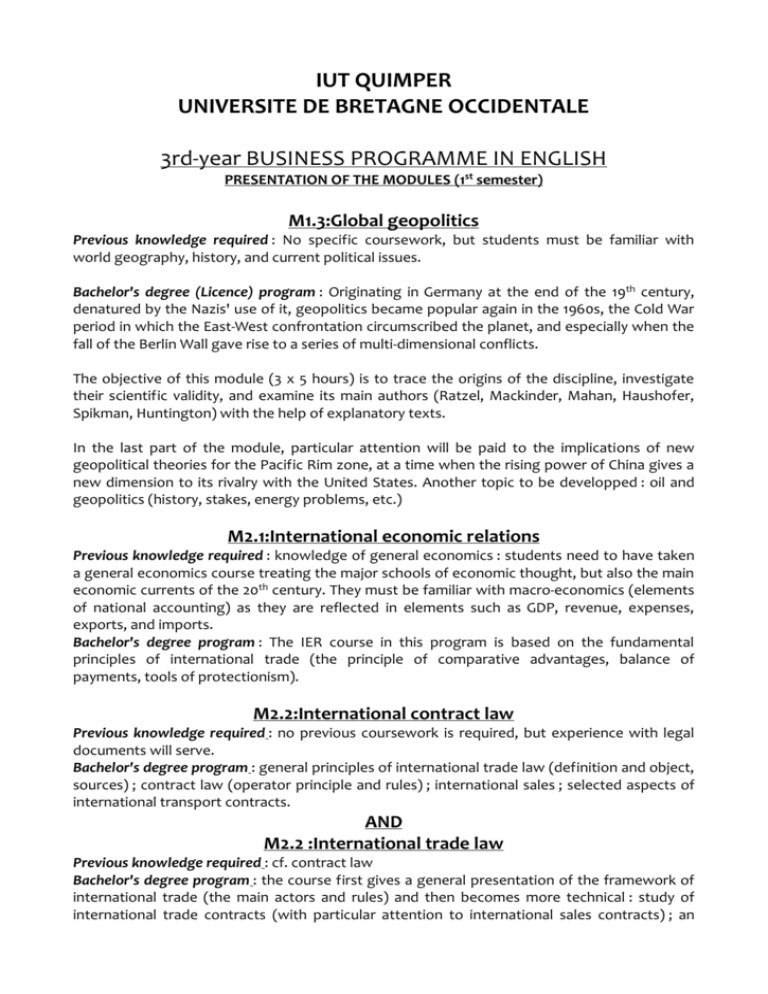
IUT QUIMPER UNIVERSITE DE BRETAGNE OCCIDENTALE 3rd-year BUSINESS PROGRAMME IN ENGLISH PRESENTATION OF THE MODULES (1st semester) M1.3:Global geopolitics Previous knowledge required : No specific coursework, but students must be familiar with world geography, history, and current political issues. Bachelor's degree (Licence) program : Originating in Germany at the end of the 19th century, denatured by the Nazis' use of it, geopolitics became popular again in the 1960s, the Cold War period in which the East-West confrontation circumscribed the planet, and especially when the fall of the Berlin Wall gave rise to a series of multi-dimensional conflicts. The objective of this module (3 x 5 hours) is to trace the origins of the discipline, investigate their scientific validity, and examine its main authors (Ratzel, Mackinder, Mahan, Haushofer, Spikman, Huntington) with the help of explanatory texts. In the last part of the module, particular attention will be paid to the implications of new geopolitical theories for the Pacific Rim zone, at a time when the rising power of China gives a new dimension to its rivalry with the United States. Another topic to be developped : oil and geopolitics (history, stakes, energy problems, etc.) M2.1:International economic relations Previous knowledge required : knowledge of general economics : students need to have taken a general economics course treating the major schools of economic thought, but also the main economic currents of the 20th century. They must be familiar with macro-economics (elements of national accounting) as they are reflected in elements such as GDP, revenue, expenses, exports, and imports. Bachelor's degree program : The IER course in this program is based on the fundamental principles of international trade (the principle of comparative advantages, balance of payments, tools of protectionism). M2.2:International contract law Previous knowledge required : no previous coursework is required, but experience with legal documents will serve. Bachelor's degree program : general principles of international trade law (definition and object, sources) ; contract law (operator principle and rules) ; international sales ; selected aspects of international transport contracts. AND M2.2 :International trade law Previous knowledge required : cf. contract law Bachelor's degree program : the course first gives a general presentation of the framework of international trade (the main actors and rules) and then becomes more technical : study of international trade contracts (with particular attention to international sales contracts) ; an exposé of the guarantees which the law offers international trade operators for settlement of their claims (sureties and performance). Detailed presentation of the modes of litigation settlement. The course also explains some of the practical aspects of intra-community trade (competition, free circulation of merchandise, freedom of establishment and the unrestricted exchange of services within the European Union). No particular knowledge of law is expected of those taking this course, insofar as it includes a review of the main principles of contract law. It nonetheless requires a willingness to learn legal terms. M2.3 :International Management : Bachelor's degree programme: (International development & the principles of Management ) A review of the most important organizational theories A review of the international development of firms (English texts and case(s) study) An analysis of the impact of the management of the organisation on the international development of the firm.(English texts and case studies) The new concepts of internationalization and the development of the small and medium-sized enterprises in a global economy M2.4 :International marketing Previous knowledge required : previous study of marketing or sales techniques is recommended. Those who have not taken such courses should acquire the knowledge beforehand, by consulting for example a work of general marketing and sales techniques. It is indispensable for students to have oral and written mastery of the French language. Main themes: The contemporary international environment and how companies respond to it. the foundations of international marketing and inter-cultural marketing. strategic international marketing. selection, study, and canvassing of foreign markets. international product policy. international pricing policy. international distribution (sales) policy. international communication policy. Teaching methods lectures centering on theoretical, technical, cultural and ethical aspects of the subject. tutorials on managerial and operational aspects of the subject using case studies on existing companies and the application of principles to actual situations in various parties of the world Evaluation an essay exam (first semester) a case study exam (second semester) oral presentations, attendance, and seriousness M.3.1: Maritime economics 1. 2. 3. 4. Fishery and Aquaculture: Production (3 hours) and markets (3 hours) Renewable Marine Energies (3 hours) Marine pollution and Invasive species (3 hours) Marine transportation and tourism (3 hours) M.3.2 : Intellectual property law I. Introduction to intellectual property A) Overview 1. Origin and stakes of IP 2. International political trends and incentives 3. WIPO organization B) The impact of IP 1. Impact on companies 2. Impact on economies II. Copyrights & Related rights A) Main principles 1. Works Protected by Copyright 2. Ownership and duration of copyrights B) Rights Protected & Limitations on Rights 1. Economic rights 2. Moral rights 3. Transfer of Copyrights, Duration of Copyright III. Industrial property rights Main characteristics and protection A) Trademarks B) Industrial Designs C) Patents D) Geographical Indications E) Protection of New Varieties of Plants IV. IP strategy for companies A) The strategic use of IP 1. IP rights are assets 2. Offensive and defensive strategies B) Profiting from IP 1. Partnerships 2. Licensing 3. The specific case of open innovation M.3.3 :Advanced Management Study of the environmental, cultural and political aspects and their impacts on the development of MNEs, impact of organisational choices on the internationalization of the firm Use of the GEM report, Case Studies M.3.4 / Marketing and innovation: I - Introduction and overview A) The concept of innovation 1. Invention & Innovation 2. The economic concept of innovation: 3. Innovation: influence of the political vision (and recommendations) B) Innovation & marketing strategies: A concept at the crossroads of: what is desirable to users, what is possible with technology, what is viable in the market-place? II – Different types of innovations A) The pathways to investigate when searching for good ideas 1. 2. 3. 4. Product Innovation Process Innovation Positioning Innovation Paradigm Innovation B) The main characteristics of innovation and their relevant marketing strategyIII 1. Technological innovation 2. Incremental innovation 3. Behavior innovation 4. Breakthrough innovation – disruptive III - The co-evolution of Technology, Firms, and Markets A) Innovation secrets 1. Uniqueness as a strategy 2. 7 Principes behind breakthrough success: case study “Steve Jobs and Apple’s Marketing success” B) The relevance of marketing in the success of innovation 1. From the concept to product development 2. Product protection 3. Extending the marketing mix: the 3 added Ps C) The strategy of open innovation

